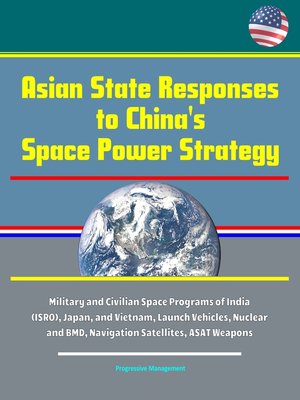Asian State Responses to China's Space Power Strategy--Military and Civilian Space Programs of India (ISRO), Japan, and Vietnam, Launch Vehicles, Nuclear and BMD, Navigation...
ebook

Sign up to save your library
With an OverDrive account, you can save your favorite libraries for at-a-glance information about availability. Find out more about OverDrive accounts.
Find this title in Libby, the library reading app by OverDrive.



Search for a digital library with this title
Title found at these libraries:
| Library Name | Distance |
|---|---|
| Loading... |
This report has been professionally converted for accurate flowing-text e-book format reproduction. China's rise as a space power has coincided with its quest for hegemony in the Indo-Pacific. Advances in China's space capabilities constitute a threat to regional states' national security, economic competitiveness, and national prestige. Accordingly, regional space powers have revised their strategies to better compete with China. This thesis examines Japan's, India's, and Vietnam's renewed approaches to space power and space security amidst China's rise. Shifts in military, commercial, and civil space policy are examined among the selected case studies. This thesis finds that Asian states are departing from historical norms by employing militarized space assets to counter the security threat from China. They are also allowing the private sector to play a larger role in their commercial space industry to improve efficiency, innovative capacity, and diplomatic outreach. Bilateral and multilateral cooperation, as well as investments in techno-nationalist space-science projects, also supplement the renewed soft-power response to Chinese space diplomacy. This thesis presents policy prescriptions for the United States to capitalize on the increasing degree of alignment among regional space powers' strategic interests. Recommendations include enhanced military-to-military relations, relaxation of commercial restrictions, and increased cooperation in civil space to balance against China.
This compilation includes a reproduction of the 2019 Worldwide Threat Assessment of the U.S. Intelligence Community.
Asian states are growing increasingly concerned over China's growing space capabilities and are devoting renewed attention to their respective space security strategies in response. Demonstrations such as China's 2003 manned Shenzhou V launch and 2007 anti-satellite (ASAT) test have triggered varying responses from Asian states that perceive these growing space capabilities as threats to national security and regional stability. Though existing research has delved into how Asian states are individually addressing China's space-related capabilities through internal initiatives, and how states are responding to the rise of China in terrestrial-economic and military contexts, a research gap lies in comparative analysis of Asian states' strategic responses to China's growing space power. Accordingly, this thesis aims to address the following question: How have Asian states' space power strategies adapted to China's rise as a space power?
Space is presently a far more dynamic and anarchic domain than it was throughout the Cold War. No longer dominated by just the superpowers' civil and military programs, international space activity is now complemented by an array of emerging commercial and military actors, as well as a substantial number of developing states. The rapid increase in international space activity following the Cold War has occurred outside of traditional cooperative norms, increasing the risk and stakes of space-related conflict. The brisk introduction of new actors in space, all with unique motivations and interests, challenges previous understanding of space power and space security, as states craft strategies that account for these post-Cold War shifts. Pursuing more than just military interests, China's space power strategy has particularly responded to these changes, as it has reaped utility from civil and commercial space activity while simultaneously achieving national security objectives. As China continues to employ this multifaceted approach, rival Asian states...







